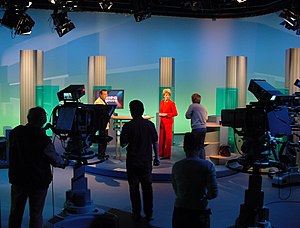
Back برنامج تلفزيون Arabic برنامج د تلفازة ARY Тэлевізійная праграма Byelorussian Телевизионно предаване Bulgarian टीवी शो Bihari টেলিভিশন অনুষ্ঠান Bengali/Bangla Abadenn skinwel Breton Programa de televisió Catalan زنجیرەی تەلەڤیزیۆنی CKB Televizní pořad Czech

A television show, TV program (British English: programme), or simply a TV show, is the general reference to any content produced for viewing on a television set that is traditionally broadcast via over-the-air, satellite, or cable. This generally excludes breaking news or advertisements that are aired between shows or between segments of a show. A regularly recurring show is called a television series, and an individual broadcast of such a series is called an episode. Content is produced either in-house on a television stage with multiple cameras or produced by contract with film production companies. Episodes are usually broadcast in annual sets, which are called seasons in North America and series in other regions. A one-off television show may be called a television special, while a short series of episodes is a miniseries. A television film, or telefilm, is a feature film created for broadcasting on television.
Television shows are most often scheduled for broadcast well ahead of time and appear on electronic guides or other TV listings, though the rise of streaming services has made television schedules less relevant than in earlier decades. Some programming may be aired live—that is, events are broadcast at the time they happen rather than at a later time or date—but the vast majority or programming is produced ahead of time. Originally, viewers had no practical way to record a show for later viewing; this changed with the advent of home video, first in the form of videotape recorded on VCRs and later in the form of digital video recorders. Cable television providers began offering certain programming "pay-per-view" or video on demand on-demand, with viewers paying a one-time fee to watch a program at a time of their own choosing. Modern streaming television allows viewers to watch programming at any time with a subscription to the service.